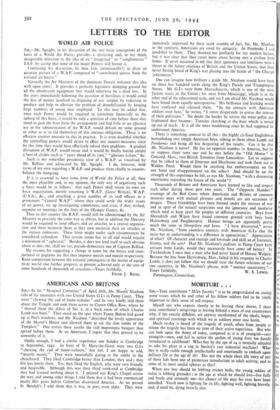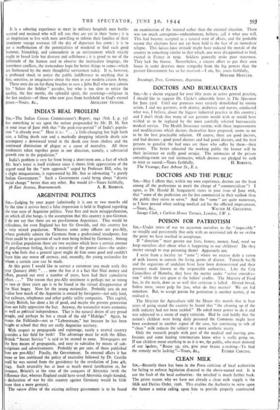MORITURI . . .
SIR,—Your contributor " Miles Juvenis " is to be congratulated on stating some issues which he and other of his fellow soldiers feel to be vitally important to their sense of self-respect.
Myself one who expects shortly to be leaving these shores, I share your contributor's misgivings at leaving behind a mass of our countrymen who, if not exactly diffident, are anyway uninformed of the ideals, hopes, and spiritual yearnings with which we as soldiers enter into battle.
Much to-day is heard of the tragedy of youth, often from people to whom the tragedy has been no item of their active experience. But who can look upon the Army of today, composed as it is of youngish—very youngish—men, and fail to notice the pathos of young lives too hastily introduced to adulthood? What boy by the age of 14 is mentally adjusted to take his place as a cog in Society's vast industrial machine? What boy is really stable enough intellectually and emotionally to embark upon military life at the age of 01? Has not the whole short life story of any of these lads been one of premature introduction to adult activity, and to some of its most sordid spheres at that?
When any boy should be lobbing cricket balls, the young soldier of today is lobbing grenades ; at the age at which he should live—live fully and freely and intensely too—his chance of life may for ever have been annulled. Youth now is fighting for its life, fighting well, fighting bravely, and, if need be, dying bravely also.
ft is a sobering experience to meet in military hospitals men battle- scarred and maimed who will tell you they are yet in their 'teens ; it is an inspiration to live with men unwilling to inform their families of their imminent voyage overseas till the day of departure has come ; it is to me a reaffirmation of the potentialities of mankind to find such good humour, friendship, and camaraderie in an environment which strictly ought to breed little but distrust and selfishness ; it is proof to me of the infinitude of the human soul to observe the inarticulate longings, the innermost conflicts, the tremendous hope for better things to come—which are harboured by the more thoughtful servicemen today. It is, however, a profound shock to notice the public indifference to anything that is fine, sensitive, or imaginative abOut the men in our modern citizen Army.
These men die on far-flung beaches to save a John Bull who may admire his " Salute the Soldier " parades, but who is too slow to notice the quality, the fine mettle, the splendid spirit, the yearnings—religious in the last analysis—of those who now pass from battlefield to God's eternal































 Previous page
Previous page